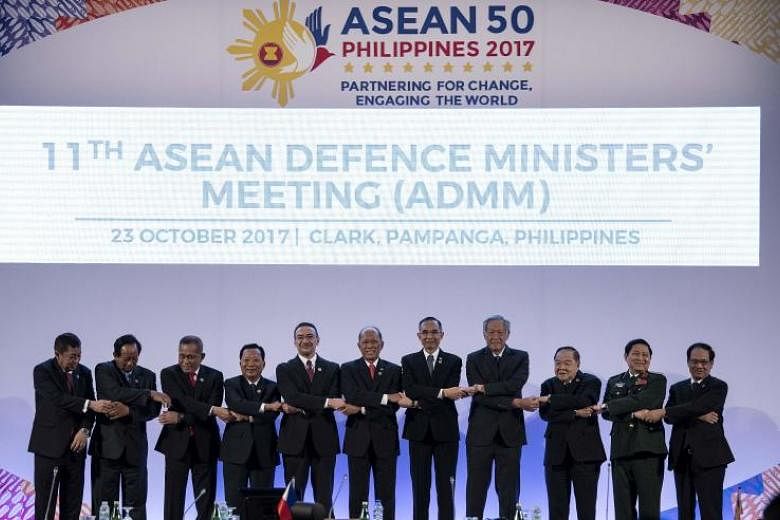MANILA - South-east Asia's defence ministers on Monday (Oct 23) vowed to come up with an "enhanced" regional response to evolving threats from Islamist extremists.
In a joint statement issued on the opening day of their annual meeting at a former US air base north of Manila, the ministers pledged to work together to "identify ways to strengthen counter-terrorism cooperation among Asean defence establishments".
In talks on the sidelines of the meeting, Singapore and China also agreed to work closely to deepen ties between Asean and China, including planning for an inaugural Asean-China maritime exercise.
The Asean defence ministers agreed to share more information on terrorist networks across Asia, step up surveillance of militant groups, and promote public awareness about the threat of radicalism.
In a statement, Singapore's Ministry of Defence said the ministers "highlighted the need for Asean to respond collectively given that terrorism is a problem that no country can singlehandedly manage".
They also "reaffirmed the importance of regional counter-terrorism initiatives", such as the joint maritime and air patrols of terrorist-plagued waters off Sulu archipelago in Mindanao and Sabah initiated by Indonesia, Malaysia and the Philippines, the ministry said.
Singapore, in particular will "step-up counter-terrorism collaboration between the Asean defence establishments" during its chairmanship of Asean and ADMM next year, the ministry quoted Defence Minister Ng Eng Hen as saying.
At a special breakfast meeting of the ministers on counter-terrorism, Malaysia's Defence Minister Hishammuddin Hussein warned that with the collapse of the Islamic State in Iraq and Syria (ISIS) caliphate in Raqqa, in Syria, "the disturbing prospect… is that the Asia-Pacific is now in Daesh's (ISIS) crosshairs".
"This threat to our region is real and multidimensional, whether from returning fighters, regional franchises or, more disturbingly, from self-radicalised lone wolves," he said.
Datuk Seri Hishammuddin said Asean, in response, "must no longer operate in silos".
He said a fierce, five-month war between Philippine troops and Muslim militants that levelled half of the southern city of Marawi, cost over 1,000 lives and displaced hundreds of thousands, "can easily manifest itself in other parts of the region and beyond".
On another thorny issue confronting the region, Asean's defence ministers stuck to a non-confrontational stand towards China concerning disputes in the South China Sea, despite prodding from the United States for a tougher stand.
They reiterated calls to conclude a "code of conduct" (COC) meant to prevent conflicting territorial claims in the South China Sea from erupting into violent confrontations.
In August, Asean's foreign ministers endorsed a two-page "framework" paving the way for actual negotiations on the COC to take place by year's end.
The defence ministers reaffirmed "the importance of maintaining and promoting peace, security, stability, safety and freedom of navigation in and overflights above the South China Sea".
The ministers' joint declaration came as US Defence Secretary James Mattis sought to unite Asean against China, as US President Donald Trump prepares to send a strong message to challenge Beijing.
"(Asean gives) voice to those who want relations between states to be based on respect, and not on predatory economics or on the size of militaries," Mr Mattis told reporters, without mentioning China by name.
"The United States remains unambiguously committed to supporting Asean," he added.
As Singapore, the Asean-China coordinator from 2015 to 2018, prepares to assume chairmanship of Asean next year, Dr Ng and his Chinese counterpart, General Chang Wanquan, yesterday discussed "further practical initiatives to advance Asean-China relations".
"This includes planning for conduct of an inaugural Asean-China maritime exercise," Mindef said in a statement.
China proposed such an exercise last year, at the China-Asean Defence Ministers' Informal Meeting in Vientiane. It aims to build mutual trust between China and the regional grouping, several of whose members have competing claims with Beijing in the South China Sea.
At the Shangri-La Dialogue in June, Dr Ng said such an exercise will "promote collaborations and deepen cooperation". The Code for Unplanned Encounters at Sea, he said, can be practised during the exercise.


